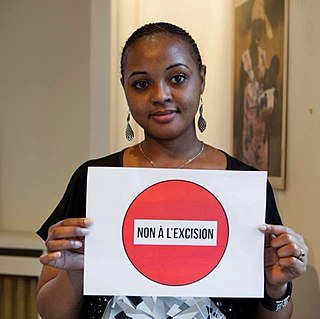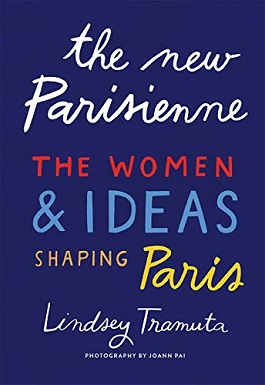
Female genital mutilation (FGM) is the cutting or removal of some or all of the vulva for non-medical reasons. FGM prevalence varies worldwide, but is majorly present in some countries of Africa, Asia and Middle East, and within their diasporas. As of 2024, UNICEF estimates that worldwide 230 million girls and women had been subjected to one or more types of FGM.

Waris Dirie is a Somali model, author, actress and human rights activist in the fight against female genital mutilation (FGM). From 1997 to 2003, she was a UN special ambassador against FGM. In 2002 she founded her own organization in Vienna, the Desert Flower Foundation. She has won numerous awards recognizing her work on eradicating FGM, including the Chevalier de la Légion d’Honneur (2007).
Pierre Foldès is a French-Hungarian surgeon known for developing a surgical method of repairing some of the damage caused by female genital mutilation.
The Inter-African Committee on Traditional Practices Affecting the Health of Women and Children(IAC) (French: Comité interafricain sur les pratiques traditionnelles affectant la santé des femmes et des enfants) is a non-governmental organization (NGO) which seeks to change social values and raise consciousness towards eliminating female genital mutilation (FGM) and other traditional practices which affect the health of women and children in Africa.
International Day of Zero Tolerance for Female Genital Mutilation is a United Nations-sponsored annual awareness day that takes place on February 6 as part of the UN's efforts to eradicate female genital mutilation. It was first introduced in 2003.

Clitoral hood reduction, also termed clitoral hoodectomy, clitoral unhooding, clitoridotomy, or (partial) hoodectomy, is a plastic surgery procedure for reducing the size and the area of the clitoral hood in order to further expose the glans of the clitoris.
Nawal M. Nour is an Obstetrician/Gynecologist who directs the Ambulatory Obstetrics Practice at the Brigham and Women's Hospital. Her research and practice focus on providing the right care to women who have undergone female genital mutilation/cutting (FGM/C), also called female circumcision, and she founded the first and only hospital center in the U.S. that focuses on the medical needs of African women who have undergone FGM/C. In 2017, she was listed in Forbes among 40 Women To Watch.

Women in Senegal have a traditional social status as shaped by local custom and religion. According to 2005 survey, the female genital mutilation prevalence rate stands at 28% of all women in Senegal aged between 15 and 49.
The status of women in Iraq has been affected by wars, Islamic law, the Constitution of Iraq, cultural traditions, and secularism. Hundreds of thousands of Iraqi women are war widows, and Women's rights organizations struggle against harassment and intimidation while they work to promote improvements to women's status in the law, in education, the workplace, and many other spheres of Iraqi life. Abusive practices such as honor killings and forced marriages remain problematic.

Female genital mutilation (FGM), also known as female genital cutting (FGC), female genital mutilation/cutting (FGM/C) and female circumcision, is practiced in 30 countries in western, eastern, and north-eastern Africa, in parts of the Middle East and Southeast Asia, as well as in specific minority enclaves in regions such as South Asia and Russia, and within some immigrant communities in Europe, North America and Australia. The WHO defines the practice as "all procedures that involve partial or total removal of the external female genitalia, or other injury to the female genital organs for non-medical reasons."
Female genital mutilation in the United Kingdom is the ritual removal of some or all of the external female genitalia of women and girls living in the UK. According to Equality Now and City University London, an estimated 103,000 women and girls aged 15–49 were thought to be living with female genital mutilation (FGM) in England and Wales as of 2011.
Nigeria has the highest rate of female genital mutilation (FGM) in the world in total numbers. It is usually experienced by girls aged 0 to 15 years old. It involves either partial or complete removal of the vulva or other injury to the female genital organs and has no medical benefit.
Aissa Edon is a Malian midwife living in London and an activist against female genital mutilation (FGM). She has worked with victims of FGM in Switzerland, France, Belgium and the UK since 2016. In 2014 she established a foundation, The Hope Clinic, which raises awareness about FGM and helps women who have experienced it. In 2016, she was awarded a Mary Seacole Scholar Award by the Royal College of Nursing, and took part in 2015 was one of the BBC's 100 Women.

Awa Thiam is a Senegalese politician, academic, writer, and activist. She serves as Senegal's Director of the National Center for Assistance and Training of Women under the Ministry of Women and Children. She is an advocate against female genital mutilation (FGM), which she speaks on in her 1978 book La Parole aux négresses. She has a body of work published internationally, in both French and English. In 1982, she founded the Commission pour l'Abolition des Mutilations Sexuelles, which fights for the abolition of FGM. Thiam is among the women featured in the 1992 anthology Daughters of Africa edited by Margaret Busby.
Hawa Ahmed Youssouf is a Djiboutian civil servant and politician. In 1999 she was appointed Minister-Delegate for the Promotion of Women, Family and Social Affairs, the first female minister in the country. Four years later she also became one of the first group of women elected to the National Assembly.

Sahiyo is a non-governmental organization founded in 2015, to advocate for girls' and women's rights and oppose the practice of female genital mutilation (FGM) in Asian communities, with a focus on the Dawoodi Bohra community in India.
Rugiatu Turay is a Sierra Leonean women's rights activist. who is a staunch campaigner against female genital mutilation. She is the founder of The Amazonian Initiative Movement, a nonprofit organization with the main objective of eliminating the cultural practice of female genital mutilation in West Africa.

Diaryatou Bah is a feminist and secular activist from Guinea.

The New Parisienne: The Women & Ideas Shaping Paris is a 2020 non-fiction book written by New York Times journalist Lindsey Tramuta and with photography by Joann Pai. It was originally slated to release in April 2020, but was pushed to July later that year due to the COVID-19 pandemic and the murder of George Floyd. It features profiles of 40 Parisian women, including activists, writers, and chefs.

Linda Weil-Curiel is a French lawyer. In 2017, she was awardrd the Knight of the Legion of Honor.










